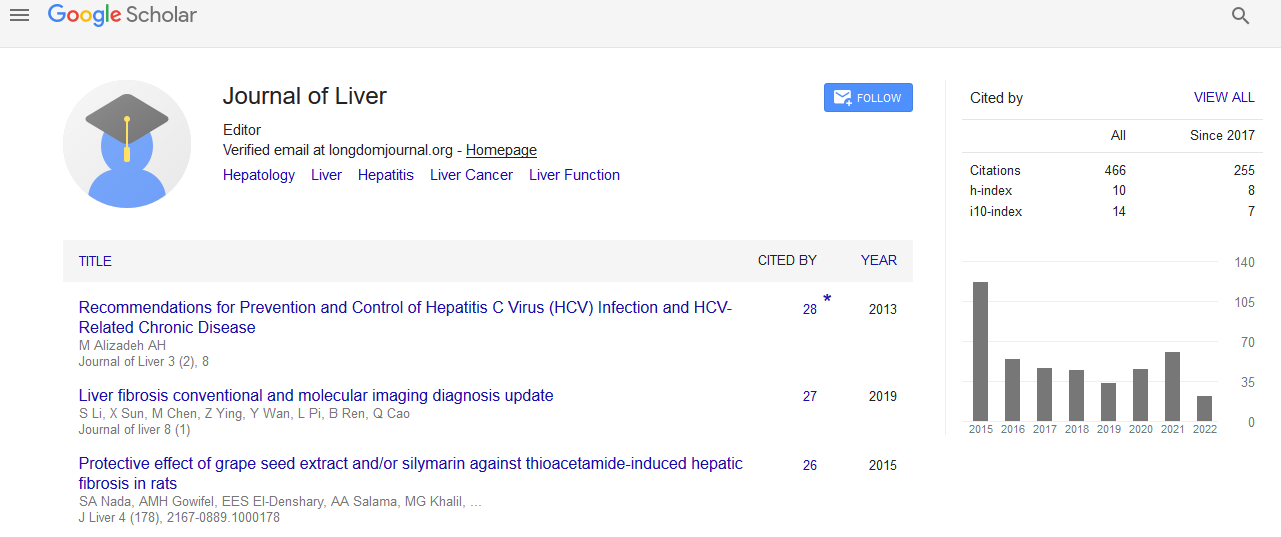PMC/PubMed Indexed Articles
Indexed In
- Open J Gate
- Genamics JournalSeek
- Academic Keys
- RefSeek
- Hamdard University
- EBSCO A-Z
- OCLC- WorldCat
- Publons
- Geneva Foundation for Medical Education and Research
- Google Scholar
Useful Links
Share This Page
Journal Flyer

Open Access Journals
- Agri and Aquaculture
- Biochemistry
- Bioinformatics & Systems Biology
- Business & Management
- Chemistry
- Clinical Sciences
- Engineering
- Food & Nutrition
- General Science
- Genetics & Molecular Biology
- Immunology & Microbiology
- Medical Sciences
- Neuroscience & Psychology
- Nursing & Health Care
- Pharmaceutical Sciences
Hedgehog signaling blockade delays Hepatocarcinogenesis induced by Hepatitis B virus X protein
World Congress on Hepatitis
July 20-22, 2015 Orlando, Florida, USA
Mark Feitelson
Scientific Tracks Abstracts: J Liver
Abstract:
The hepatitis B virus (HBV) encoded X protein (HBx) contributes centrally to the pathogenesis of hepatocellular carcinoma (HCC). Aberrant activation of the Hedgehog (Hh) pathway has been linked to many tumor types including HCC. Thus, experiments were designed to test the hypothesis that HBx promotes HCC via activation of Hh signaling. HBx expression correlated with an upregulation of Hh markers in human liver cancer cell lines, in liver samples from HBV infected patients with HCC, and in the livers of HBx transgenic mice (HBxTg) that develop hepatitis, steatosis, and dysplasia, culminating in the appearance of HCC. The findings in human samples provide clinical validation for the in vitro results and those in the HBxTg. Blockade of Hh signaling inhibited HBx stimulation of cell migration, anchorage-independent growth, tumor development in HBxTg, and xenograft growth in nude mice. Results suggest that the ability of HBx to promote cancer is at least partially dependent upon the activation of the Hh pathway. This study provides biologic evidence for the role of Hh signaling in the pathogenesis of HBV-mediated HCC and suggests cause and effect for the first time. The observation that inhibition of Hh signaling partially blocked the ability of HBx to promote growth and migration in vitro and tumorigenesis in two animal models implies that Hh signaling may represent an ?oncogene addiction? pathway for HBV-associated HCC. This work could be central to designing specific treatments that target early development and progression of HBx-mediated HCC.
Biography :
Mark Feitelson attended Cypress College (Cypress, CA) from 1970-72, and then received a BS degree in Biology from the University of California, Irvine in 1974. Advanced studies resulted in a PhD in Microbiology and Immunology from the UCLA School of Medicine in 1979. His thesis presented the genetic organization of the rabbit papilloma virus. He was then an American Cancer Society Postdoctoral fellow in the Department of Medicine at Stanford University from 1980-1982, where he started his work with hepatitis B virus (HBV). He was then recruited to the Fox Chase Cancer Center by Dr. Baruch Blumberg (who won the Nobel Prize for his discovery of HBV) where he continued his work in HBV. He is presently Professor of Biology at Temple University and Associate Director of the Temple Biotechnology Center. He has been consistently funded by NIH and foundations since 1988 for basic science work on HBV and has attracted 10 contracts from industry for translational and applied work since 1997. He has over 100 publications in highly ranked international scientific journals, has written two books, delivered more than 160 oral presentations and/or posters at national and international scientific meetings, and has delivered more than 100 invited lectureships all over the world.

